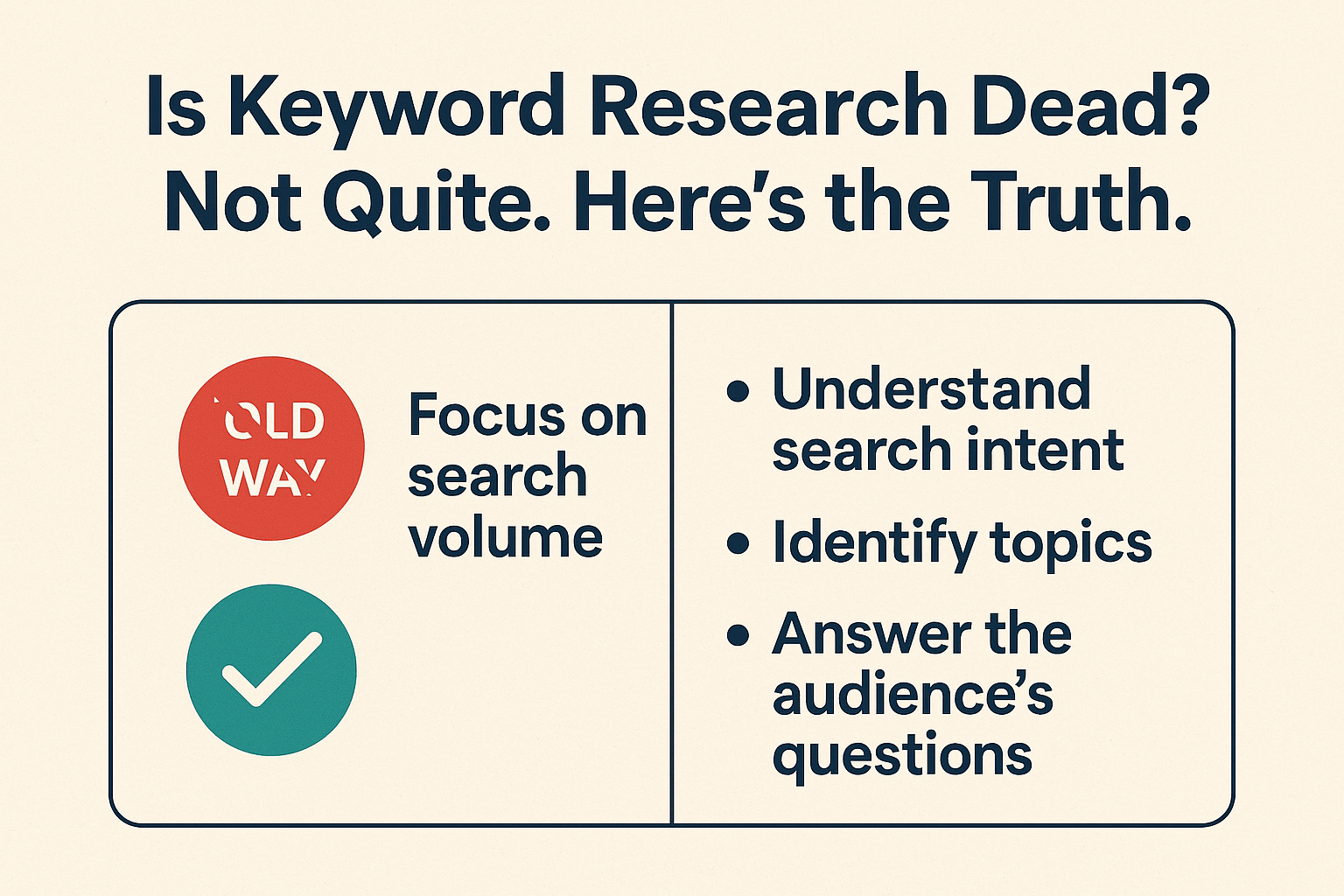Abdullah Usman
You’re scrolling through LinkedIn, and another “SEO expert” declares keyword research is officially dead. Meanwhile, your competitor just stole your top customer using the exact search terms you’ve been ignoring. Sound familiar?
After 8 years of running SEO campaigns for businesses ranging from local coffee shops to million-dollar e-commerce stores, I’ve heard this “keyword research is dead” narrative more times than I can count. The truth? It’s not dead—it’s just wearing a completely different outfit than it did five years ago.
The real issue isn’t that keyword research has become obsolete. It’s that most business owners are still using 2019 strategies in a 2025 world. Google’s algorithms have evolved beyond simple keyword matching to embrace semantic SEO, user intent, and contextual understanding. This means your approach needs to evolve too, or you’ll keep wondering why your competitors are ranking while you’re stuck on page three.
Why Everyone Thinks Keyword Research Died (Spoiler: They’re Wrong)
The confusion started when Google rolled out major algorithm updates like BERT and MUM, which fundamentally changed how search engines interpret queries. Suddenly, exact-match keywords weren’t the golden ticket they used to be. Many SEO Services providers panicked and declared the entire practice obsolete.
Here’s what actually happened: A local bakery owner I worked with was targeting “best chocolate cake Denver” with laser focus. Despite perfect optimization, her rankings tanked after Google’s updates. The problem wasn’t that keyword research failed—she was targeting the wrong intent. People searching that phrase wanted reviews and recommendations, not a bakery’s homepage.
When we shifted her strategy to target “custom chocolate cakes Denver delivery” and “birthday cakes near me,” her organic traffic increased by 340% in six months. The keywords mattered, but understanding what people really wanted when they searched became the game-changer.
What Modern Keyword Research Actually Looks Like in 2025
Today’s keyword research isn’t about stuffing your content with exact phrases. It’s about understanding the complete customer journey and mapping content to every stage of that journey.
Smart business owners now focus on keyword clusters instead of individual terms. For example, an e-commerce store selling fitness equipment shouldn’t just target “home gym equipment.” They need to understand that searchers also use terms like “compact workout gear,” “apartment fitness setup,” and “space-saving exercise machines.” These semantic variations help search engines understand your content’s true relevance.
The numbers don’t lie. According to recent data, websites using topic clusters and semantic keyword strategies see 65% more organic traffic than those stuck in the old exact-match mindset. This approach particularly benefits Ecommerce SEO, where product variations and user preferences create natural keyword families.
How Search Intent Changed Everything (And What This Means for Your Business)
Google now prioritizes search intent over keyword density. This shift explains why some pages rank for thousands of keywords they never directly targeted. Understanding the four types of search intent—informational, navigational, commercial, and transactional—has become crucial for effective keyword strategy.
Consider a Shopify store owner selling organic skincare products. Instead of obsessing over “organic face cream,” successful stores now target intent-based phrases:
- Informational: “benefits of organic skincare routine”
- Commercial: “best organic face cream for sensitive skin”
- Transactional: “buy organic anti-aging cream online”
This approach helps search engines understand exactly what value you provide at each stage of the customer journey. The result? Higher rankings, better click-through rates, and more qualified traffic that actually converts.
The Tools and Techniques That Actually Work Today
Modern keyword research requires a blend of traditional tools and fresh approaches. While platforms like SEMrush and Ahrefs remain valuable, the real insights come from understanding your customers’ language and pain points.
Start with your existing customer data. What questions do they ask during sales calls? Which product descriptions generate the most engagement? Your customer service team holds goldmine information about the exact words your audience uses to describe their problems.
Social media listening has become equally important. Join Facebook groups, Reddit communities, and industry forums where your target audience hangs out. The language they use in casual conversations often differs significantly from what keyword tools suggest, but it’s exactly what they type into search boxes.
For Local SEO, this approach is particularly powerful. A restaurant owner discovered that locals searched for “date night spots downtown” instead of “romantic restaurants [city name].” This single insight helped them capture 200% more reservations from organic search.
When Keyword Research Still Matters (More Than You Think)
Despite all the changes, keyword research remains the foundation of effective SEO strategy. The difference is how we use that research. Smart businesses use keywords to understand market demand, competitive landscapes, and content opportunities.
An SEO Audit often reveals that struggling websites aren’t targeting the wrong keywords—they’re targeting keywords their audience doesn’t actually search for. Real keyword research prevents this costly mistake by validating market demand before you invest time and resources in content creation.
For e-commerce businesses, keyword research directly impacts inventory decisions. If search volume for “sustainable yoga mats” is growing 40% year-over-year while “cheap yoga mats” is declining, that’s valuable business intelligence that goes far beyond SEO.
The Biggest Keyword Research Mistakes Costing You Money
The most expensive mistake I see business owners make is treating keyword research as a one-time activity. Your customers’ language evolves, new competitors enter the market, and industry trends shift constantly. Static keyword strategies become obsolete within months.
Another costly error is ignoring long-tail keywords. While “shoes” gets massive search volume, “waterproof hiking boots for women size 8” represents someone ready to buy. These specific phrases often convert 2-3 times better than broad terms, making them particularly valuable for On Page SEO optimization.
Many businesses also make the mistake of competing for keywords outside their league. A local hardware store shouldn’t target “power tools” when Home Depot and Lowe’s dominate those results. Instead, focusing on “power tool rental [city name]” or “professional contractor tools near me” creates winnable opportunities with higher conversion potential.
Action Steps: Your Modern Keyword Research Strategy
Ready to modernize your approach? Start with these concrete steps:
Begin by auditing your current keyword performance using Google Search Console. Identify which terms drive traffic but don’t convert, and which high-converting terms need more content support. This data reveals gaps in your current strategy and opportunities for quick wins.
Create topic clusters around your main service areas. If you offer SEO Services, build clusters around local SEO, technical SEO, content optimization, and link building. Each cluster should include primary keywords, supporting terms, and related questions your audience asks.
Develop a quarterly keyword review process. Set calendar reminders to analyze search trends, competitive changes, and new opportunities. This regular maintenance prevents your strategy from becoming stale and helps you stay ahead of market shifts.
For immediate results, focus on keyword opportunities where you already rank between positions 4-10. These represent low-hanging fruit where small improvements can generate significant traffic increases.
The Real Truth About Keyword Research in 2025
Keyword research isn’t dead—it’s more sophisticated and more important than ever. The businesses thriving in today’s search landscape aren’t the ones that abandoned keyword research. They’re the ones who evolved their approach to match how search engines and users actually behave.
The old days of keyword stuffing and exact-match optimization are gone, but understanding what your customers search for remains crucial. Modern keyword research combines data analysis with customer psychology, competitive intelligence with content strategy, and technical SEO with user experience optimization.
Your competitors who claim keyword research is dead are either using outdated methods or trying to simplify a complex process. Meanwhile, smart business owners are using modern keyword research to understand their market, create content that resonates, and build sustainable organic growth.
The question isn’t whether keyword research matters—it’s whether you’re doing it right. In a world where 68% of online experiences begin with a search engine, understanding and optimizing for how people search isn’t optional. It’s the difference between being found by your ideal customers and watching them discover your competitors instead.
Ready to transform your keyword strategy and see real results? Your customers are searching for solutions you provide—make sure they can find you.


